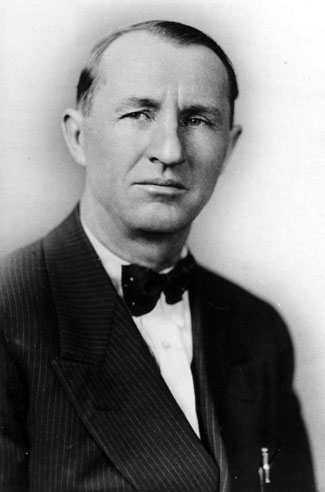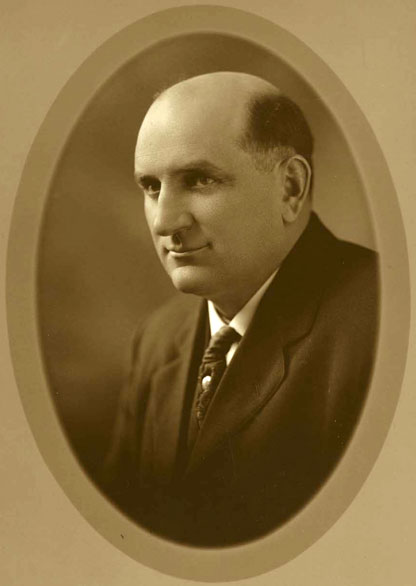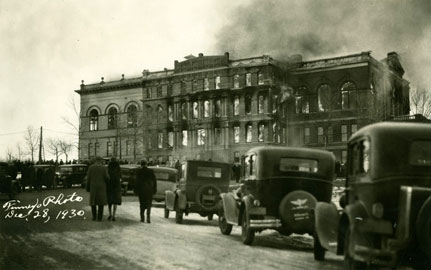We’ve launched a new web portal! Visit findhistory.nd.gov to search our collections.
Due to a road closure, the Killdeer Mountain Battlefield State Historic Site is temporarily closed.

These movements procreated the Nonpartisan League, North Dakota's greatest political insurgency. The NPL, born in 1915, united progressives, reformers, and radicals behind a platform that called for many progressive reforms, ranging from improved state services and full suffrage for women to state ownership of banks, mills and elevators, and insurances. Led by A. C. Townley, the NPL used the primary election to take control of the Republican Party in 1916, dominated all state government by 1918, and enacted its program in 1919. Its administration, headed by Governor Lynn J. Frazier, instituted many reforms in state government; among them were re-organization of state services, expansion of educational services, development of health care agencies, and improved regulation of public services and corporations. However, its core program generated fierce opposition fueled by funds from out-of-state corporations; those interests used every means to obstruct the NPL program, including lawsuits and extreme propaganda.

The anti-NPL movement gained strength during and after World War I. Charging that the NPL's leaders, many of whom were former Socialists, were opponents of American participation in World War I, the anti-NPL forces coalesced in late 1918 into the Independent Voter's Association. Vitriolic political infighting followed. The IVA attacked on many fronts, rapidly sowing disunity within the NPL and splitting the coalition of cooperative groups that had helped support the League. Economic distress caused by the precipitous decline in grain prices after World War I and a drought in western North Dakota helped diminish NPL support. In 1920, the IVA took control of one legislative house and in 1921 forced a recall election that deposed Governor Frazier and other members of the Industrial Commission that governed state-owned industries. The NPL era, one that significantly altered North Dakota government, had ended.
The NPL left an indelible mark on the state. The Bank of North Dakota at Bismarck, opened in 1919, has become a large and powerful economic force; the State Mill and Elevator at Grand Forks, completed in 1922, provided a market for grain and a source of feed and seed; the state hail insurance program benefitted many farmers until its elimination in the 1960s. Perhaps most importantly, the NPL established an insurgent tradition in the state that blurred party lines for four decades, and both the League and the IVA elevated a generation of leaders to power. Each official recalled in 1921, for example, later regained public office.
For North Dakota the 1920s and 1930s proved to be watersheds. An economic Depression, starting with the 1920 collapse of wartime prices for grain, punctured the economic expansion of previous decades. More North Dakota banks closed in 1921 than in any other year; the resulting contraction of credit caused many farm foreclosures.
Simultaneously, farm sizes increased, and many farmers mechanized their operations. A dramatic shift to motorized transportation placed greater emphasis on better roads and bridges. 
State Capitol Fire, Dec-28-1930, Finny Photo
State Archives #10154-66As the times changed, new devices entered the state's homes; radio, especially, became commonplace after the first stations went on the air in North Dakota in 1922. Likewise, motion pictures attracted thousands, and many theaters were built in towns across North Dakota. These economic and social factors had by 1930 made North Dakota a different place than a decade earlier. The fire that destroyed the old state capitol building on December 28, 1930, symbolized the end of an era.
Address:
612 East Boulevard Ave.
Bismarck, North Dakota 58505
Get Directions
Hours:
State Museum and Store: 8 a.m. - 5 p.m. M-F; Sat. & Sun. 10 a.m. - 5 p.m.
We are closed New Year's Day, Easter, Thanksgiving Day, and Christmas Day. We are closed at noon Christmas Eve if it falls on Mon.-Thurs. and are closed all day if it falls on Fri.-Sun.
State Archives: 8 a.m. - 4:30 p.m. M-F, except state holidays; 2nd Sat. of each month, 10 a.m. - 4:30 p.m. Appointments are recommended. To schedule an appointment, please contact us at 701.328.2091 or archives@nd.gov.
State Historical Society offices: 8 a.m. - 5 p.m. M-F, except state holidays.
Contact Us:
phone: 701.328.2666
email: history@nd.gov
Social Media:
See all social media accounts